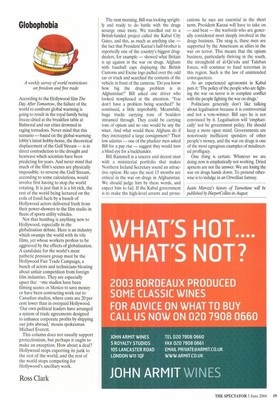Globophobia
A weekly survey of world restrictions on freedom and free trade According to the Hollywood film The Day After Tomorrow, the failure of the world to confront global warming is going to result in the royal family being freeze-dried at the breakfast table at Balmoral and our cities drowned in raging tornadoes. Never mind that this scenario — based on the global-warming lobby's latest hobby-horse, the theoretical displacement of the Gulf Stream — is in direct contradiction to the drought and heatwave which scientists have been predicting for years. And never mind that much of the film's scenes are physically impossible: to reverse the Gulf Stream, according to some calculations, would involve first having to stop the world rotating. It is just that it is a bit rich, the rest of the world being lectured on the evils of fossil fuels by a bunch of Hollywood actors delivered fresh from their power-showers to the film studio in fleets of sports utility vehicles.
Not that humbug is anything new to Hollywood, especially in the globalisation debate. Here is an industry which swamps the world with its vile films, yet whose workers profess to be aggrieved by the effects of globalisation. A candidate for the world's most pathetic pressure group must be the Hollywood Fair Trade Campaign, a bunch of actors and technicians bleating about unfair competition from foreign film industries. They are especially upset that -rime studios have been filming scenes in Mexico to save money or have been contracting work out to Canadian studios, where costs are 20 per cent lower than in overpaid Hollywood. 'Our own political leaders have arranged a system of trade agreements designed to enhance corporate profits by shipping our jobs abroad,' moans spokesman Michael Everett.
This column does not usually support protectionism, but perhaps it ought to make an exception. How about a deal? Hollywood stops exporting its junk to the rest of the world, and the rest of the world stops competing for Hollywood's ancillary work.
The next morning, Bill was looking sprightly and ready to do battle with the drugs scourge once more. We travelled out to a British-funded project called the Kabul City Gates, and this, as much as anything else — the fact that President Karzai's half-brother is reportedly one of the country's biggest drugdealers, for example — showed what Britain is up against in the war on drugs. Afghans with baseball caps displaying the British Customs and Excise logo pulled over the odd car or truck and searched the contents of the vehicle in front of the cameras. 'Do you know how big the drugs problem is in Afghanistan?' Bill asked one driver who looked nonplussed at the attention. 'You don't have a problem being searched?' he continued, a little improbably. Meanwhile, huge trucks carrying tons of boulders streamed through. They could be carrying tons of opium and no one would be any the wiser. And what would these Afghans do if they intercepted a large consignment? Their low salaries — one of the pluckier men asked Bill for a pay rise — suggest they would turn a blind eye for a backhander.
Bill Rammell is a sincere and decent man with a ministerial portfolio that makes Northern Ireland Secretary sound an attractive option. He says the next 15 months are critical in the war on drugs in Afghanistan. We should judge him by these words, and expect him to fail. If the Kabul government is to make the high-level arrests and prose
cutions he says are essential in the short term, President Karzai will have to take on — and beat — the warlords who are generally considered most deeply involved in the drugs business. The snag is, these men are supported by the Americans as allies in the war on terror. This means that the opium business, particularly thriving in the south, the stronghold of al-Qa'eda and Taleban forces, will continue to fund terrorism in this region. Such is the law of unintended consequences.
As an experienced agronomist in Kabul puts it: 'The policy of the people who are fighting the war on terror is in complete conflict with the people fighting the war on drugs.'
Politicians generally don't like talking about legalisation because it is controversial and not a vote-winner. Bill says he is not convinced by it. Legalisation will 'emphatically' not be government policy. He should keep a more open mind. Governments are notoriously inefficient spenders of other people's money, and the war on drugs is one of the most egregious examples of misdirected profligacy.
One thing is certain. Whatever we are doing now is emphatically not working. Dried apricots are not the answer. We are losing the war on drugs hands down. To pretend otherwise is to indulge in an Orwellian fantasy.
Justin Marozzi's history of Tamerlane will be published by HarperCollins in August










































































 Previous page
Previous page